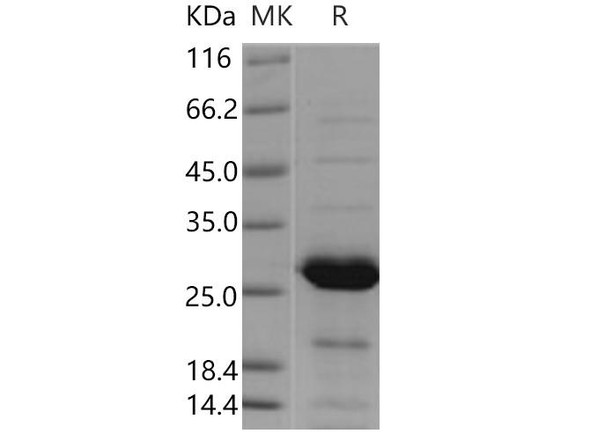Human PSPH Recombinant Protein (RPPB2639)
- SKU:
- RPPB2639
- Product Type:
- Recombinant Protein
- Species:
- Human
- Uniprot:
- P78330
- Research Area:
- Enzymes
Description
| Product Name: | Human PSPH Recombinant Protein |
| Product Code: | RPPB2639 |
| Size: | 20µg |
| Species: | Human |
| Target: | PSPH |
| Synonyms: | Phosphoserine phosphatase, EC 3.1.3.3, PSP, O-phosphoserine phosphohydrolase, PSPase, L-3-phosphoserine phosphatase, PSPH. |
| Source: | Escherichia Coli |
| Physical Appearance: | Sterile filtered colorless solution. |
| Formulation: | The protein contains 20mM Hepes pH 7.5, 1mM DTT &100mM KCl2. |
| Stability: | Store at 4°C if entire vial will be used within 2-4 weeks. Store, frozen at -20°C for longer periods of time. For long term storage it is recommended to add a carrier protein (0.1% HSA or BSA). Avoid multiple freeze-thaw cycles. |
| Purity: | Greater than 95.0% as determined by:(a) Analysis by RP-HPLC.(b) Analysis by SDS-PAGE. |
| Amino Acid Sequence: | MVSHSELRKL FYSADAVCFD VDSTVIREEG IDELAKICGV EDAVSEMTRR AMGGAVPFKA ALTERLALIQ PSREQVQRLI AEQPPHLTPG IRELVSRLQE RNVQVFLISG GFRSIVEHVA SKLNIPATNV FANRLKFYFN GEYAGFDETQ PTAESGGKGK VIKLLKEKFH FKKIIMIGDG ATDMEACPPA DAFIGFGGNV IRQQVKDNAK WYITDFVELL GELEE |
Human Phosphoserine phosphatase (hPSP) is an important enzyme in the phosphorylated pathway of serine biosynthesis, which contributes a major portion of the endogenous L-serine. Similar to known L-3-phosphoserine phosphatases, it catalyzed the Mg2+-dependent hydrolysis of L-phosphoserine and an exchange reaction between L-serine and L-phosphoserine. Recently, its complex structures reveal that the open-closed environmental change of the active site, generated -helical bundle domain, is important to substrate by local rearrangement of the recognition and hydrolysis.
Phosphoserine Phosphatase Human Recombinant produced in E.Coli is a single, non-glycosylated polypeptide chain containing 225 amino acids and having a molecular mass of 25 kDa. PSP was overexpressed in E. coli and purified by conventional chromatography.
| UniProt Protein Function: | Catalyzes the last step in the biosynthesis of serine from carbohydrates. The reaction mechanism proceeds via the formation of a phosphoryl-enzyme intermediates. |
| NCBI Summary: | The protein encoded by this gene belongs to a subfamily of the phosphotransferases. This encoded enzyme is responsible for the third and last step in L-serine formation. It catalyzes magnesium-dependent hydrolysis of L-phosphoserine and is also involved in an exchange reaction between L-serine and L-phosphoserine. Deficiency of this protein is thought to be linked to Williams syndrome. [provided by RefSeq, Jul 2008] |
| UniProt Code: | P78330 |
| NCBI GenInfo Identifier: | 46249388 |
| NCBI Gene ID: | 5723 |
| NCBI Accession: | NP_004568 |
| UniProt Secondary Accession: | P78330,Q7Z3S5, B2RCR5, |
| UniProt Related Accession: | P78330 |
| Molecular Weight: | 25,008 Da |
| NCBI Full Name: | phosphoserine phosphatase |
| NCBI Synonym Full Names: | phosphoserine phosphatase |
| NCBI Official Symbol: | PSPH�� |
| NCBI Official Synonym Symbols: | PSP; PSPHD�� |
| NCBI Protein Information: | phosphoserine phosphatase |
| UniProt Protein Name: | Phosphoserine phosphatase |
| UniProt Synonym Protein Names: | L-3-phosphoserine phosphatase; O-phosphoserine phosphohydrolase |
| Protein Family: | Psp operon transcriptional activator |
| UniProt Gene Name: | PSPH�� |










